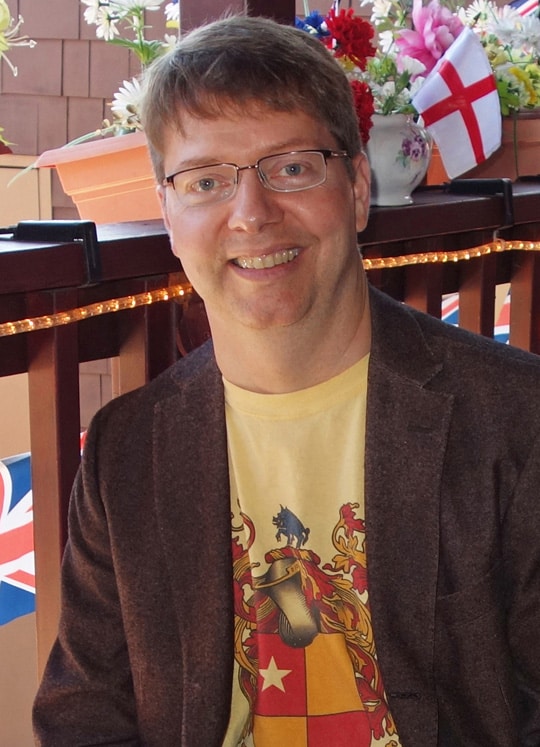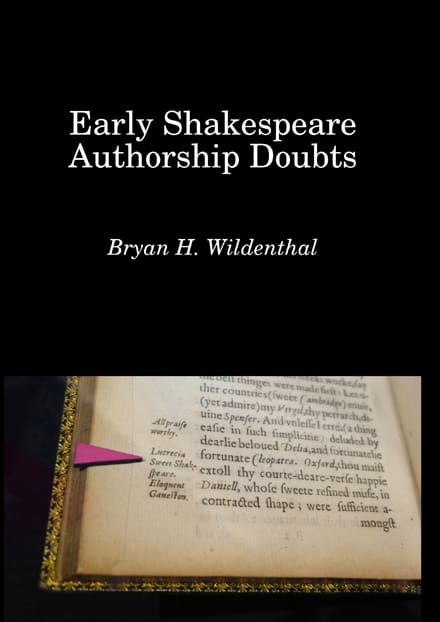
June 24, 2019 — Professor Bryan H. Wildenthal has published a landmark new book, Early Shakespeare Authorship Doubts. The book refutes the commonly heard Stratfordian claim that nobody entertained any doubts about authorship until hundreds of years after the death of William Shakspere of Stratford-upon-Avon (1564–1616), the actor and businessman conventionally credited as the author.
Wildenthal is a widely published law professor and legal historian whose work has been cited by the U.S. Supreme Court. (Update: Wildenthal is a former Vice President of the SOF and former member of the Board of Trustees.)
The book examines dozens of early authorship doubts before the 1616 death of William Shakspere of Stratford, including at least five separate indications that the true author of the works of “Shakespeare” (whoever that was) died years before 1616. Several early publications suggest that the authorial name was a pen name or pseudonym. Some also suggest the writer was an aristocrat, and a few hint specifically that Edward de Vere (17th Earl of Oxford) was the author. Wildenthal previewed his book in a lecture on October 14, 2017, at the SOF Annual Conference in Chicago.
While conceding that this mass of evidence calls for more study and debate, Wildenthal demonstrates, at a minimum, that authorship doubts were “an authentic and integral part of the very time and culture that gave rise to the works of Shakespeare” (see, e.g., pp. 20, 318–19, 348). Yet these early doubts have been ignored by most academics, some of whom simply deny their existence.
(Update: Wildenthal presented a follow-up lecture, “Early Authorship Doubts: The Oxfordian Connections,” on October 3, 2020, as part of the SOF Online Shakespeare Authorship Symposium.)
Portions of the book are freely available here in PDF format (if prompted by SSRN to create an account, which is free and useful, you may still “download without registration” by clicking on the link above the SSRN founder’s message). The full book is for sale on Amazon.com here (reviews are always welcome), but Wildenthal advises that the best price and product quality are available in hardcover and paperback on Lulu.com.
The book has been hailed as a major breakthrough by acclaimed British writer Alexander Waugh, author of Fathers and Sons (2007), a memoir of Waugh’s literary family including his grandfather, Evelyn Waugh. Waugh declares: “Professor Wildenthal’s witty and forensic tour de force examines the evidence of Shakespeare’s contemporaries and what they really thought of him. Seldom is the argument against conventional opinion so devastatingly articulated.”
 Wildenthal comments on what drove him to write the book:
Wildenthal comments on what drove him to write the book:
“The last straw for me was listening to Columbia University Professor James Shapiro, one of the top four or five Shakespeare experts in the world, being interviewed on the radio in December 2016.”
“Shapiro repeated this false meme we hear so commonly, that authorship doubts are just a modern fad, that they didn’t even arise until the 1850s, hundreds of years after Shakespeare’s time.”
“Then, adding insult to falsehood, Shapiro boasted he would flunk any student who dared to persist in raising authorship questions. I’m sure he’d claim he was joking, but it really shocked me.”
“I’ve been a teacher most of my life, and it’s just appalling, the very idea of ridiculing and shutting down students for daring to raise totally legitimate questions about the greatest literary mystery of all time.”
Wildenthal nevertheless expresses frustrated admiration for his fellow academic Shapiro:
“He’s one of our leading public intellectuals, and a brilliant writer. I own and admire several of his books. Like so many of us, he obviously loves Shakespeare, the writer, whoever that was. But comments like Shapiro’s, joking or not, are psychological bullying, pure and simple. It’s also anti-intellectual denialism. These early doubts are spread all over the historical record. They’re documented facts. What’s his response to them? He just ignores them for the most part. How can you claim to be a scholar and take that attitude? I knew right then, listening to that interview, that I simply had to write this book.”
Wildenthal emphasizes that his book builds upon the work of dozens of other scholars. “I could never have even started this project without all the earlier work by so many others, people like Diana Price, Roger Stritmatter, Katherine Chiljan, Alexander Waugh, so many others. I have a long preface discussing that, and 26 pages of bibliography. I have a special fondness for Sir George Greenwood, and I guess identify with him to some extent as a fellow lawyer who became, like me, an amateur Shakespeare scholar.” (The preface and bibliography are in the portions of the book freely available here.)
Greenwood (1850–1928) was a British barrister and Member of Parliament who became the first really major and serious post-Stratfordian scholar, writing mainly before the first modern articulation of the Oxfordian theory in 1920 (see Wildenthal’s book, pp. 84–86, 293).
Wildenthal also notes that he reads and cites carefully and respectfully, while disputing on the merits where warranted, both the works of leading orthodox academics like Shapiro, Professor Lukas Erne, Professor Alan Nelson, Sir Stanley Wells, and Sir Jonathan Bate, and also the writings of independent Stratfordian scholars like David Kathman, Terry Ross, and Tom Reedy. Speaking of the latter, he comments: “I only wish they would read skeptical scholarship carefully and with respect. I really appreciate that they do at least engage with the authorship issue, instead of just ignoring it like most tenured academics. But too often, it’s painfully obvious they’ve simply failed to do their homework and have not kept up with the evidence or the debate.”
(Update: As Wildenthal has noted, orthodox academics have historically ignored Oxfordian evidence for the most part, instead engaging in irrelevant and slanderous ad hominem attacks on the thousands of thoughtful skeptics who have questioned — over more than four centuries — the authorship of the works of “Shakespeare.”)
Well aware of how dense and difficult the authorship question can sometimes be, Wildenthal says he aims to bring lively humor and fresh insights to it, as well as rigorously impartial scholarship.
[published June 24, 2019, updated 2021]


